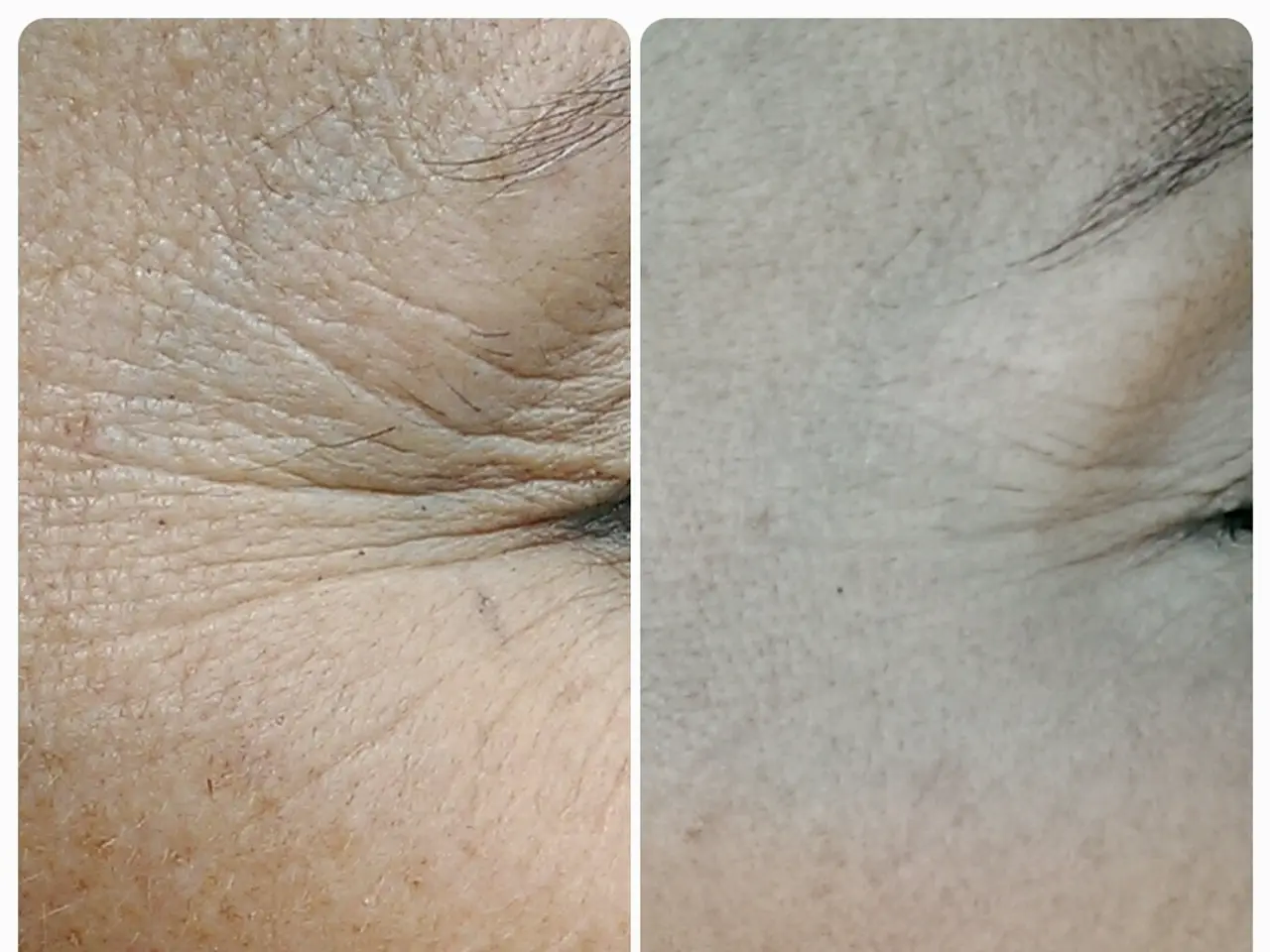Strategies for Minimizing Visible Pores: The Leading Eight Methods
Oily skin can often be a challenge, with large pores being a common concern. However, with the right home care and skincare routine, you can visibly minimize the appearance of large pores.
Regular exercise is beneficial for many reasons, but it's important to remember to rinse the skin after exercise to prevent sweat from clogging pores. A suitable exfoliating product can help remove matter that can block pores, such as dead skin cells and excess oil. Beta hydroxy acids, polyhydroxy acids, and mandelic acid are all effective exfoliating ingredients.
A key element of an effective skincare routine for oily skin is gentle cleansing with exfoliating ingredients. Cleansers containing salicylic acid (a beta-hydroxy acid) or glycolic acid (an alpha-hydroxy acid) help dissolve excess sebum and exfoliate dead skin cells, preventing pore clogging and reducing pore stretching.
It's also crucial to avoid comedogenic or harsh products. Ingredients like mineral oil, silicone, and overly rich creams can trap oil and debris, worsening the appearance of pores. Heavy makeup or infrequent washing can also enlarge pores by clogging.
Toning is another essential step in the routine. Gentle toners with ingredients like salicylic acid, niacinamide, and hyaluronic acid help remove residual impurities and maintain skin hydration, preventing overproduction of oil that can enlarge pores.
Serums with retinol and niacinamide are also beneficial. Retinol encourages cell turnover and collagen production, refining skin texture and preventing dead skin buildup in pores. Niacinamide is anti-inflammatory and can reduce pore size enlargement.
Hydration is important, but it's crucial to use hydrating but non-comedogenic moisturizers and primers. These products can maintain moisture balance without worsening pores.
Regular exfoliation is key to keeping pores clean and less stretched. Gentle surface exfoliation (chemical or physical) clears accumulated debris, keeping pores clean and less stretched.
More advanced treatments like Pico Laser, Hollywood Carbon Laser Peel, and injectable collagen-stimulating agents (Rejuran Healer) can further reduce pore size by targeting sebaceous glands, tightening skin, and boosting collagen, but these are beyond home care and require professional administration.
In summary, consistent use of gentle exfoliating cleansers, non-comedogenic moisturizers, pH-balancing toners, and active serums such as retinol and niacinamide forms the foundation of home care that can visibly minimize large pores in oily skin by regulating oil, preventing clogging, and enhancing skin renewal.
Remember, it's important not to over-exfoliate, as this can dry out the skin and make pores appear larger. Using a clay mask once or twice a week can help remove additional oil from the pores. Applying a high concentration of retinol can also improve the appearance of pores.
Washing the face twice a day, using a gentle cleanser, and patting dry with a clean towel can help make pores less visible. The American Academy of Dermatology (AAD) recommends using oil-free products, including water-based makeup. A gel-based cleanser is suitable for people with oily skin who want to make their pores less visible.
Wearing sunscreen every day can help prevent sun damage and the appearance of enlarged pores. Staying in the shade when the sun is strongest can help reduce sun exposure and potential damage to the skin. Moisturizing can help prevent pores from becoming clogged with oil, reducing their appearance.
Drinking plenty of water can improve the overall complexion by hydrating the skin from within. People with oily skin benefit from products high in humectants, such as honey and urea. Eating well can enhance a person's skin health by providing the right balance of nutrients.
By following these tips and maintaining a consistent skincare routine, you can visibly minimize the appearance of large pores in oily skin.
- In addition to skincare, staying physically active can have health benefits such as managing HIV, asthma, Crohn's disease, Alzheimer's, multiple sclerosis, type 2 diabetes, depression, and bipolar disorder.
- After exercise, it's beneficial to rinse the skin thoroughly to prevent sweat from clogging pores and causing breakouts.
- Skin-care products containing beta hydroxy acids (BHA), polyhydroxy acids (PHA), or mandelic acid can effectively exfoliate dead skin cells, excess oil, and other impurities that might cause pores to appear larger.
- Incorporating a suitable moisturizer that is non-comedogenic, like those containing hyaluronic acid or oil-free moisturizers, can help balance the skin's moisture level without clogging pores and worsening the appearance of large pores.
- Besides taking care of oily skin, it is essential to prioritize one's mental health by addressing issues like depression and anxiety, which are common among individuals with skin conditions like acne.
- Predictive science in health-and-wellness aims to develop personalized skincare and fitness-and-exercise recommendations tailored to an individual's unique needs, enhancing the overall effectiveness of their routine.
- Some advanced skin treatments, such as Pico Laser and Hollywood Carbon Laser Peel, can further refine the texture of the skin and reduce the size of pores by targeting sebaceous glands and stimulating collagen production for a more youthful appearance.
- High-concentration vitamin A (retinol) serums can be applied sparingly to improve the appearance of large pores by increasing collagen production, refining skin texture, and preventing the overproduction of oil that can lead to clogged pores.
- The Science of Beauty emphasizes the importance of addressing not only external issues, like oily skin, but also internal factors, such as diet and hydration, in achieving and maintaining beautiful, healthy skin.
- By following a consistent skincare routine that emphasizes gentle exfoliation, proper cleansing, hydration, and sun protection, one can achieve noticeable results in minimizing the appearance of large pores and improving overall skin health.
- Adopting a balanced diet rich in fruits, vegetables, lean proteins, and low-glycemic carbohydrates can contribute to improving skin health by providing essential nutrients and promoting healthy cell growth, helping combat various skin-related diseases and maintaining a radiant, glowing complexion.




